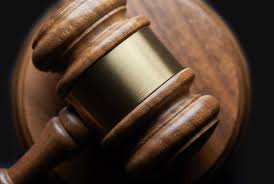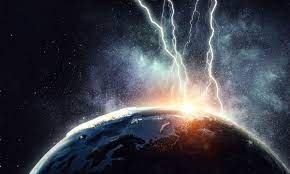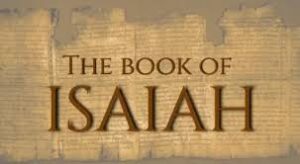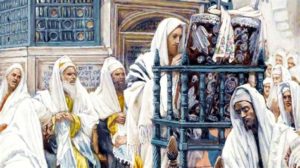Ah – The Daughter of Zion is left like a Shelter in a Vineyard 1: 5-9
The Daughter of Zion
is left like a Shelter in a Vineyard
1: 5-9
The daughter of Zion is left like a shelter in a vineyard DIG: What is their deplorable condition like? What sympathy do they get from God? What is going on in their country (also see Second Kings 16:5-6; 18:9-16)? God compares the people of Isra’el with Sodom and Gomorrah. What is the point of the comparison? The key to national well-being was righteousness (Proverbs 14:34). How had Isra’el failed in that regard?
REFLECT: When have the consequences of the sin in your life caught up with you? Did it take you further than you wanted to go? Did it cost you more than you wanted to pay? Has it turned around? If so, what did it take to shake you out of your rebellion? What can you do to help others with the same problem?
Sin always has consequences. Sometime the consequences are immediate, and sometimes they are delayed. But there are always consequences. Sin always takes you further than you want to go, and costs you more than you want to pay. That was the case with Isra’el. They were suffering the natural consequences of their rebellion against God. One of the recurring themes of Deuteronomy, Chapters 27 through 30 is the destructive results of abandoning ADONAI. For the nation, to live in a covenant relationship with Him was to experience blessing, but to break the covenant was to experience cursing. Our experience today mirrors that of the nation. Blessing or cursing from God is our choice.
Sin blinds you to the truth (Second Corinthians 4:4), and the truth was that Judah didn’t even realize they had become the enemy of God (James 4:4b). Therefore, the LORD starts off by questioning their struggle saying: Why should you be beaten anymore? Why do you persist in rebellion? Isaiah described what was happening to them to help them understand that their difficult times were a result of their rebellion. The LORD tells Isra’el that if they continue in their apostasy, the end result will only be more devastation. So why continue in the same direction, seeing that it does you absolutely no good?
ADONAI figuratively describes Isra’el’s sick and injured condition: Your whole body is injured, from the sole of your foot to the top of your head there is no soundness – only wounds and welts and lacerations, not cleansed or bandaged or soothed with oil (1:5a and 6). From the head to the foot, and everything else in between, the whole body is thoroughly beaten up due to Isra’el’s sins. The Land had become desolate or abandoned, rather than a Land flowing with milk and honey (Exodus 3:8). Although Isra’el had wounds, lacerations and open sores, the problem was not physical but spiritual: Your whole heart is afflicted (1:5b).
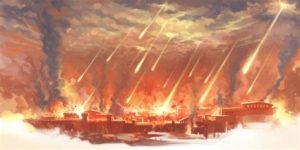
Then Isaiah changes from the picture of a sick and injured body to that of a desolate and conquered Land. This was especially in reference to the Assyrian King Sennacherib and his invasion that destroyed 46 of Judah’s fortified cites. The countryside was not devastated during Isaiah’s lifetime, but that was beside the point. Judah was already a spiritual wasteland. The prophet said: Your country is abandoned, your cities burned with fire; your fields are being stripped by foreigners right before you, laid waste as when overthrown by strangers (1:7). The Hebrew word overthrown is a technical term referring solely to the overthrow of Sodom and Gomorrah (see the commentary on Genesis, to see link click Fa – The LORD Rained Down Burning Sulfur on Sodom and Gomorrah). The Land was suffering the kind of desolation intended for strangers; in other words, this is a kind of judgment reserved for Gentile nations. But here, Isra’el was suffering. It was the kind of utter desolation that hit Sodom and Gomorrah.
Here the prophet shifts the picture again. Isaiah uses the image of the harvest shelters to remind us of the kind of desolation and helplessness that he sees resulting in ‘ because of her rebellion. The Daughter of Zion, a personification of Isra’el, had become like a shelter, a little lean-to in a vineyard, like a hut in a field of melons, like a city under siege (1:8). Instead of becoming the big house of Isra’el, it had become merely a little hut. As the fields were not always fenced it became necessary to have persons to watch them, especially while the fruit was ripening, in order to fend off all predators, whether man, beast, or bird. These keepers of the field are referred to in Jeremiah 4:17 and they are still to be seen in the east today. During the ripening season they watch day and night, and through all sorts of weather. Hence they need some protection from excessive heat, dew, or storm. This protection is found in temporary huts that are made of closely twined branches and leaves, or of pieces of matting thrown over a rough framework of poles. There is an illusion to such a frail structure in Job 25:18 and Isaiah 24:20. When the crop is gathered and the field abandoned, the deserted lodge soon leans and falls and the whole scene is one of utter loneliness. It was such a picture of abandonment to which the prophet compares the Daughter of Zion.3 This was the true condition of God’s people.
Unless ADONAI, the LORD of heaven’s angelic armies, had left some survivors, the nation of Isra’el would have been totally destroyed like Sodom and Gomorrah. Paul quotes this verse in Romans 9:27-29. In fact, Isra’el was like those two wicked cities. A small remnant had been left. Sennacherib not only destroyed 46 fortified cities; he carried 200,000 Jews away as well. Isra’el survived only because of grace of God and the believing remnant within her (Amos 4:11).
Despite all of this, there is hope for her. She is not completely destroyed, and the only possible explanation for that is the mercy of God. He could have made her like Sodom and Gomorrah, but He chose not to. This was not done in weakness because it was the LORD of heaven’s armies who did it. He is the One who had heaven’s armies ready to do His bidding at any moment (Second Kings 6:15-18). So Isaiah believed that there was hope for his people even if he himself did not live to see it, and he declared that even out of a hut in a field of melons, God is able to do great things.
There was an obvious way for Isra’el to deal with her sin, and that same opportunity is available for us today. It is simple, but not easy. ADONAI says this to us: If we claim to be without sin, we deceive ourselves and the truth is not in us. But if we confess our sins, He is faithful and just and will forgive us our sins and purify us from all unrighteousness (First John 1:9).



